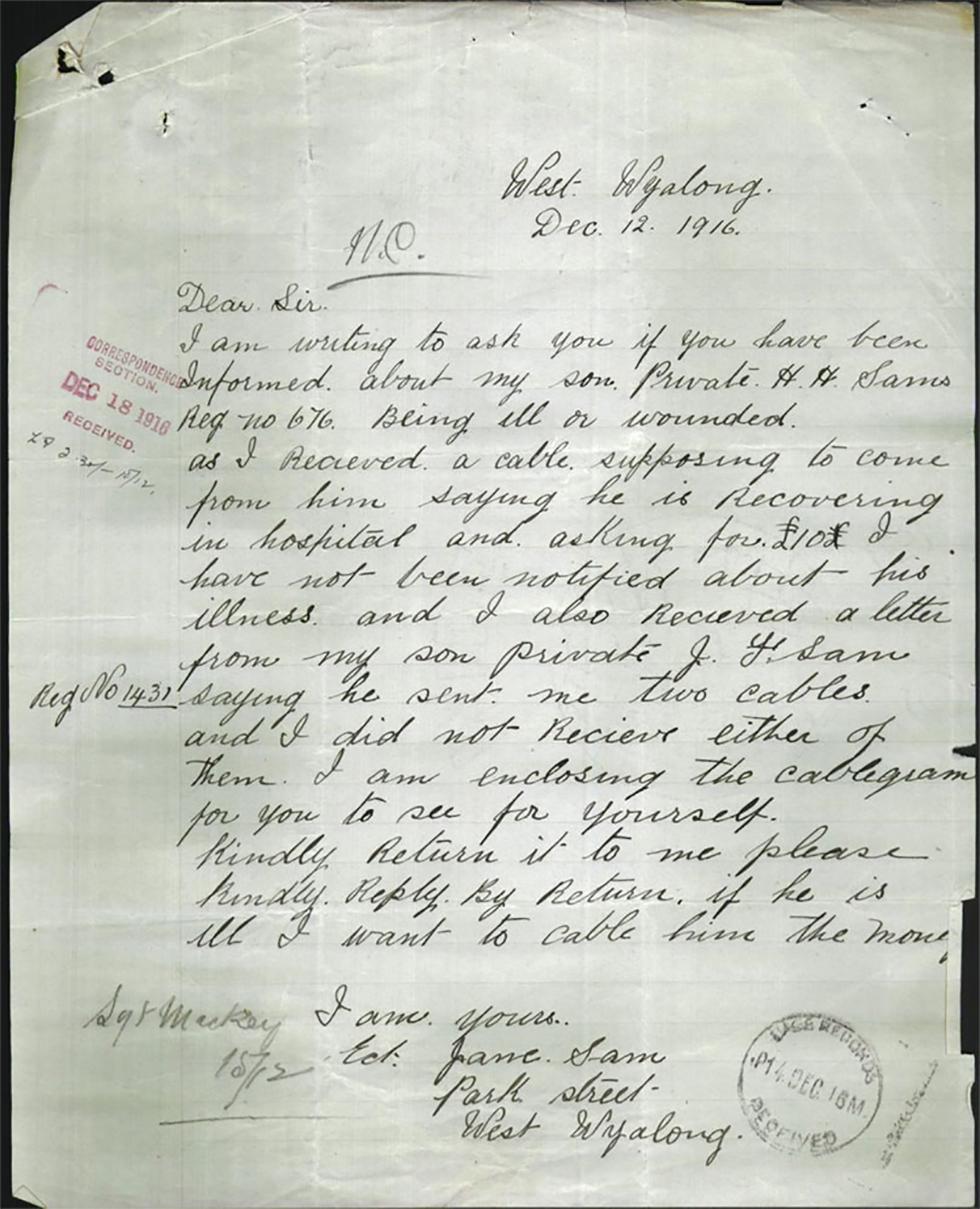


Transcript
West Wyalong.
Dec. 12. 1916
[Stamped in the left margin in red ink 'CORRESPONDENCE SECTION. DEC 18 1916. RECEIVED' with handwritten annotation '19 2 30/- 10/12.']
Dear Sir.
I am writing to ask you if you have been informed about my son Private H. H. Sam Reg no 676. Being ill or wounded. As I received a cable supposing to come from him saying he is Recovering in hospital and asking for £10£. I have not been notified about his illness. and I also received a letter from my son Private J Y Sam [added in the margin 'Reg No 1431'] saying he sent me two cables, and I did not Receive either of them. I am enclosing the cablegram for you to see for yourself.
Kindly Return it to me please Kindly [sic]. Reply, By Return, if he is ill I want to cable him the money.
I am yours,
etc. Jane Sam
Park Street
West Wyalong
[Handwritten annotation] Sgt Mackay 15/12
[Stamped in black ink 'BASE RECORDS. P14 DEC 16M. RECEIVED.']
About this record
This is a letter sent to authorities by Jane Sam of West Wyalong, NSW, in order to establish the wellbeing of one of her sons, Henry Herbert Sam, serving in the First World War. The letter, dated 12 December 1916, forms part of Henry Sam’s service record.
Educational value
- Jane Sam was the mother of 16 children. Five of her children and two of her grandchildren served in the First World War (WW1). Her husband, William Flood Sam, was a Chinese-born migrant who had come to Australia in the 1850s during the gold rush. Jane and William married in 1873.
- The 1950s gold rush attracted tens of thousands of Chinese people to Australia. Racial tensions arose on the goldfields, which later prompted the Australian Government to pass the Immigration Restriction Act 1901.
- One of Jane and William’s sons, Henry Herbert Sam, joined the Australian Imperial Force, in which two of his younger brothers were already serving. Henry may have been motivated to enlist to be closer to his brothers, for adventure, or because he did not want to be presented with a ‘white feather’. (White feathers were often presented to men who did not enlist and were perceived as cowards.) For many Chinese-Australians, Australia was the only home they knew, and enlisting provided them with an opportunity to serve their country.
- After training in Egypt, Henry’s unit landed at Anzac Cove in August 1915. He was admitted to hospital in November that year, and again in November 1916. Due to his injuries he was moved to England, where he sent a telegram to his mother requesting money. While there, he met and married an English woman named Ethel Kirby. For medical reasons he returned with his wife and newborn baby to Sydney where they changed their surname to ‘Sams’. Henry and Ethel’s son, Allen Henry Sams, served in the Second Australian Imperial Force during the Second World War.
- Despite the Sam family being considered a ‘famous fighting family’ by their local newspaper, they were still subject to laws that controlled the movement of non-European Australians. William Flood Sam and his son Percy, aged 14, had to apply for a permit to leave Australia to visit China in 1915. In 1936, Percy Sam, then aged 35, had to apply for a certificate of exemption to travel overseas. Failure to do so would have resulted in his having to sit the government’s dictation test—which was designed so that unwanted applicants would fail and be deported.
Related themes
Need help with your research?
Learn how to interpret primary sources, use our collection and more.


